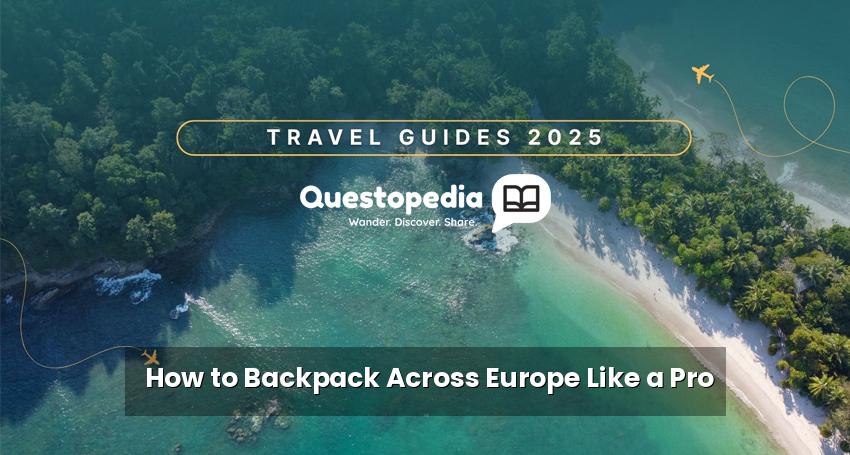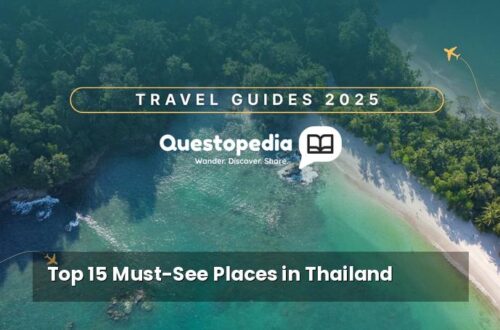How to Backpack Across Europe Like a Pro
Dreaming of exploring cobblestone streets, indulging in delicious cuisines, and immersing yourself in vibrant cultures? Backpacking across Europe is an incredible adventure, but it can also be overwhelming. This comprehensive guide will equip you with the knowledge and strategies to backpack across Europe like a pro, maximizing your experiences while minimizing stress and expenses.
Planning Your European Backpacking Adventure
The key to a successful backpacking trip lies in meticulous planning. Here’s how to lay the foundation for an unforgettable journey:
1. Defining Your Budget and Timeline
First, determine your budget. Europe offers options for every budget, from budget-friendly hostels to luxurious hotels. Research average daily expenses in the countries you plan to visit. Consider factors like accommodation, transportation, food, and activities. Similarly, define your timeline. A month? Three months? The duration will significantly impact your itinerary and pacing. Consider applying for a travel credit card that offers points or cashback on travel purchases. Some cards also offer travel insurance, which can be a lifesaver in unexpected situations.
2. Crafting Your Itinerary
While spontaneity is exciting, having a rough itinerary is essential. Identify your must-see destinations. Consider the distance between cities and the best transportation options. Websites like Rome2Rio can help you compare travel times and costs. Don’t over-pack your itinerary; leave room for unexpected discoveries and spontaneous detours. Think about incorporating themes or regions (e.g., exploring only the Balkans, focusing on historical sites, indulging in culinary adventures). Remember to check visa requirements for each country you plan to visit.
3. Booking Flights and Accommodation
Book your flights well in advance, especially if you’re traveling during peak season. Utilize flight comparison websites like Skyscanner and Google Flights to find the best deals. For accommodation, hostels are a budget-friendly option. Websites like Hostelworld offer a wide selection of hostels across Europe. Consider booking accommodations in advance, particularly in popular tourist destinations. Also, check out platforms like Airbnb for potentially cheaper options or unique stays.
Packing Smart for Your European Adventure
Packing light is crucial for comfortable backpacking. Here’s a minimalist packing list:
1. Choosing the Right Backpack
Invest in a comfortable and durable backpack. Aim for a size between 40-60 liters. Ensure it has padded shoulder straps, a hip belt, and adjustable torso length. Test different backpacks with weight to find the best fit for your body. Consider a backpack with organizational compartments to keep your belongings organized. Research reputable brands like Osprey, Deuter, and North Face.
2. Essential Clothing Items
Pack versatile clothing items that can be mixed and matched. Include quick-drying and lightweight fabrics. Pack the following:
* 3-4 t-shirts
* 1-2 long-sleeved shirts
* 1 pair of jeans or travel pants
* 1 pair of shorts or a skirt
* Underwear and socks (pack enough for 5-7 days)
* A comfortable pair of walking shoes
* Sandals or flip-flops
* A lightweight jacket or fleece
* A waterproof jacket or poncho
* Swimsuit (if applicable)
3. Other Essential Gear
Don’t forget these essential items:
* Travel towel (quick-drying)
* Universal adapter
* Portable charger
* First-aid kit
* Toiletries (travel-sized)
* Reusable water bottle
* Headlamp or flashlight
* Copies of important documents (passport, visa, etc.)
* Money belt or secure wallet
* A good book or e-reader for downtime.
Navigating Europe Like a Local
Embrace local customs and use efficient transportation options to get around.
1. Transportation Options
Europe offers a variety of transportation options:
* Trains: An excellent way to travel between cities and countries. Consider purchasing a Eurail pass if you plan on extensive train travel. Check out Eurail.com for pass options.
* Buses: A budget-friendly option, especially for longer distances. Flixbus is a popular bus company in Europe.
* Flights: Can be cost-effective for certain routes, especially if booked in advance. Low-cost airlines like Ryanair and EasyJet offer affordable fares.
* Local transport: Utilize public transportation within cities, such as metros, trams, and buses. Consider purchasing a city travel card for unlimited access.
2. Communication and Staying Connected
Purchase a local SIM card or use an international roaming plan to stay connected. Free Wi-Fi is widely available in cafes and public spaces. Learn a few basic phrases in the local language to enhance your interactions with locals. Download offline maps and translation apps for easy navigation and communication. Consider a VPN (Virtual Private Network) for secure internet access on public Wi-Fi networks.
3. Safety and Security
Be aware of your surroundings and take precautions against petty theft. Keep your valuables secure and avoid walking alone in poorly lit areas at night. Research common scams in the regions you are visiting. Consider purchasing travel insurance to protect yourself against unexpected events. Learn about the local emergency numbers and procedures. Always trust your instincts and avoid situations that feel uncomfortable.
Eating and Drinking Like a European
Food is an integral part of experiencing any culture. Sample local delicacies and enjoy regional specialties.
1. Budget-Friendly Eating Options
* Eat at local markets and street food stalls for affordable and authentic meals.
* Cook your own meals at hostels or Airbnb accommodations.
* Take advantage of happy hour deals and lunchtime specials.
* Look for local supermarkets and bakeries for snacks and drinks.
* Carry a reusable water bottle and refill it throughout the day.
2. Must-Try European Dishes
* Pasta in Italy
* Paella in Spain
* Croissants in France
* Goulash in Hungary
* Fish and Chips in the UK.
3. Respecting Local Customs
Be mindful of local dining etiquette. Tip appropriately and be respectful of local traditions. Research the local drinking age and laws regarding alcohol consumption. Try to learn a few phrases related to food and ordering in the local language.
Conclusion
Backpacking across Europe is a transformative experience that will create lasting memories. By following these tips and preparing adequately, you can ensure a safe, enjoyable, and unforgettable adventure. Remember to be flexible, embrace spontaneity, and immerse yourself in the cultures you encounter. Safe travels! Consider visiting Questopedia for more travel tips and inspiration.






